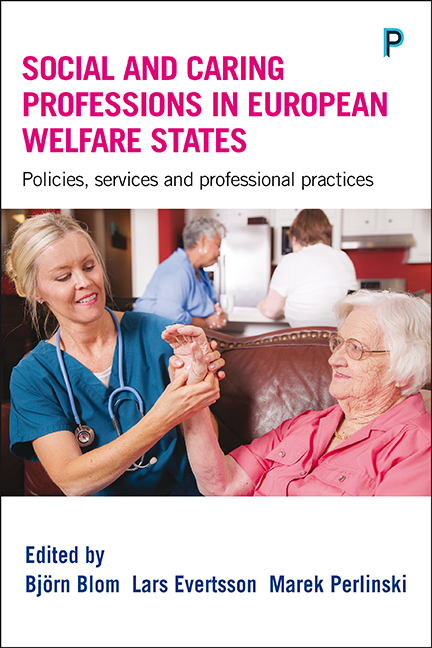 Social and Caring Professions in European Welfare States
Social and Caring Professions in European Welfare States Book contents
- Frontmatter
- Contents
- List of tables and figures
- Notes on contributors
- Preface
- one European social and caring professions in transition
- Part 1 Knowledge, reflection and identity in the social and caring welfare professions
- Part 2 Control, regulation and management
- Part 3 Collaboration, conflict and competition
- Part 4 Assessment, negotiation and decision making
- Index
one - European social and caring professions in transition
Published online by Cambridge University Press: 05 April 2022
- Frontmatter
- Contents
- List of tables and figures
- Notes on contributors
- Preface
- one European social and caring professions in transition
- Part 1 Knowledge, reflection and identity in the social and caring welfare professions
- Part 2 Control, regulation and management
- Part 3 Collaboration, conflict and competition
- Part 4 Assessment, negotiation and decision making
- Index
Summary
Introduction
The European welfare state has existed in institutionalised form since the 1880s, with the gradual launch of the Bismarck system, and in its contemporary form since after the Second World War. However, the William Beveridge report from 1942 is often regarded as having laid the foundation for the welfare state (Quadagno, 1987; Baldwin, 1990; Korpi and Palme, 1998; Kuhnle, 2000: Healy, 2009). A prominent feature of European welfare states is the existence of different professions with the task of implementing the ideals of taking care of its citizens, in particular weak and vulnerable groups. Some professions evolved long before the advent of the welfare state (for example, medicine and nursing), while others emerged in its wake (for example, social work and audiology).
Since the mid-1980s we have witnessed an increasing number of social and caring welfare professions, as more vocational groups have received a higher education. Moreover, vocational education at university level has become increasingly theoretical, and more professionals have received a licence to practise. Such changes can be said to reflect an increased professionalisation and academisation of previously known semi-professional groups (Ek et al, 2013).
In principle, professionalisation has increased the opportunities for handling various societal problems, by creating occupational groups that can use abstract knowledge independently in diverse situations. From a state perspective, this is usually one of the reasons for initiating and supporting professionalisation. At the same time, professionalisation has strengthened various occupational groups in their efforts to develop a stronger professional identity (Adams et al, 2006; Mieg, 2008), to gain recognition, influence and autonomy. This part of the process is not always perceived as positive from a state perspective, not least because autonomous professionals can be more difficult to govern and control.
Recently, however, several welfare professions have experienced an escalation in control and governance by the state, and hence reduced autonomy and professional discretion. Some argue that this constitutes an ongoing deprofessionalisation, whereby welfare professionals will have diminished opportunities to act from professional principles (Guzman, 2012). Others argue, however, that increased governance and control does not affect professionals’ work that much, since discretion is fundamental in professional practice and cannot be omitted (Jessen, 2011).
- Type
- Chapter
- Information
- Social and Caring Professions in European Welfare StatesPolicies, Services and Professional Practices, pp. 1 - 18Publisher: Bristol University PressPrint publication year: 2017
